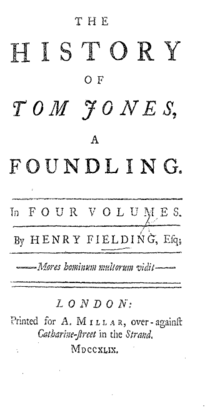
 We left off last time being told that a great temptation was coming to Tom as another effort by Fortune to keep him away from Sophia.
We left off last time being told that a great temptation was coming to Tom as another effort by Fortune to keep him away from Sophia.
It may be a great temptation, but it’s one that takes very little time or effort on his part (well, maybe some effort), and a mere 5 paragraphs—from the introduction of temptation to resolution. A rich widow who lives near the Miller residence asks Tom to court her and pretty much says she’ll make his worth his while monetarily. As he’s practically broke, this is tempting. Also, he really likes the woman, and it seems as if Sophia’s about to be out of reach really soon. He might as well, right?
But something stops him—it wouldn’t be right, so he turns her (and her money) down. “While Jones was exulting in the consciousness of his integrity,” Partridge comes in with news—he ran into an old friend, Black George. It took George a while to remember him, but once he did their friendship had been rekindled. George is in town for Blifil’s marriage to Sophia, but isn’t a fan of the man. He’ll gladly take a letter to Sophia from Tom. And so ends Book XV.
Book XVI begins with a chapter on the difficulty of writing prologues, and well, yeah…not much to say there.
Sophia refuses to consent to marry Blifil, so her father locks her in a room and then goes to drink and talk with the parson he brought along for “that evening and great part of the succeeding day, during which period nothing happened of sufficient consequence to find a place in this history.”
Then an army officer shows up to make Lord Fellamar’s proposal again. It doesn’t go well. At all and a tussle ensues. Eventually the officer leaves and Western tries again to convince Sophia to just give up and go along with this plan. She refuses again, definitively. Then she offers to stay with him, as she loves her father so much. If he’ll only stop pressuring her into an unhappy marriage, she’ll take care of him and only marry if he approves.
That doesn’t appeal to him at all. So he locks her up again,
departing with a very vulgar observation on the effect of tears…and returned to the parson, who said everything he durst in behalf of the young lady, which, though perhaps it was not quite so much as his duty required, yet was it sufficient to throw the squire into a violent rage, and into many indecent reflections on the whole body of the clergy, which we have too great an honour for that sacred function to commit to paper.
I don’t see the point of the whole Widow-throwing-herself-at-Tom Chapter, hopefully, it pays off eventually. But the other two chapters of story are pretty entertaining—full of great overly-long speeches. Still, it feels like too much time was spent spinning our wheels. I should be used to it, but it felt like momentum had been building lately. I glanced at chapter titles for the rest of Book XVI, and I think it’s going to be pretty slow, but building to something big. There’s not much left to go, things had better happen soon.
![]()

